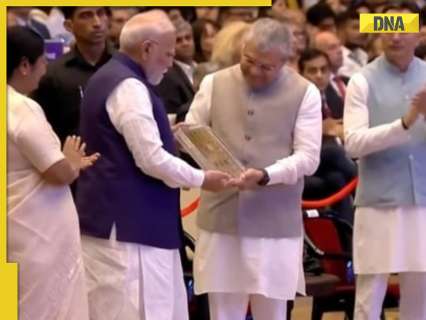
News
September 02, 2025
What is Vikram? India's first fully indigenous 32-bit chip built by ISRO lab, presented to PM Modi at Semicon India 2025
As of the date, the government has approved 10 semiconductor manufacturing projects with a cumulative investment of more than Rs 1.60 lakh crore in six states: Gujarat, Assam, Uttar Pradesh, Punjab, Odisha and Andhra Pradesh.
India's semiconductor ambitions received a major boost at Semicon India 2025 with the unveiling of "Vikram," the nation's first fully indigenous 32-bit microprocessor. Developed by a laboratory under the Indian Space Research Organisation (ISRO), Vikram represents a significant step towards self-reliance in critical technology. The chip was presented to Prime Minister Narendra Modi at the event, highlighting its national importance.
Vikram's development signifies a crucial move away from dependence on foreign sources for microprocessors, which are the brains behind countless electronic devices. As a 32-bit chip, Vikram is designed for a wide range of applications, potentially impacting sectors from industrial automation and consumer electronics to medical devices and defense. The indigenous design offers greater control over the chip's architecture and functionality, allowing for customization and enhanced security.
The unveiling of Vikram coincides with a broader government push to establish India as a global semiconductor hub. This ambition is being fueled by significant investments and policy support aimed at attracting semiconductor manufacturing and design companies to the country.
The government has already approved 10 semiconductor manufacturing projects across six states, with a total investment exceeding Rs 1.60 lakh crore. These projects are spread across Gujarat, Assam, Uttar Pradesh, Punjab, Odisha, and Andhra Pradesh, indicating a nationwide effort to build a robust semiconductor ecosystem. This geographical distribution aims to create employment opportunities and foster technological development across different regions of India.
The approved projects encompass various aspects of the semiconductor value chain, including chip fabrication, assembly, testing, marking, and packaging (ATMP) facilities. This comprehensive approach is intended to create a self-sufficient and resilient industry, capable of meeting both domestic demand and contributing to the global semiconductor market.
The introduction of Vikram and the substantial investments in semiconductor manufacturing underscore India's commitment to becoming a major player in the global electronics industry. The development of indigenous chips like Vikram is expected to further strengthen the country's technological capabilities and reduce its reliance on imports, paving the way for a more secure and prosperous future.
Vikram's development signifies a crucial move away from dependence on foreign sources for microprocessors, which are the brains behind countless electronic devices. As a 32-bit chip, Vikram is designed for a wide range of applications, potentially impacting sectors from industrial automation and consumer electronics to medical devices and defense. The indigenous design offers greater control over the chip's architecture and functionality, allowing for customization and enhanced security.
The unveiling of Vikram coincides with a broader government push to establish India as a global semiconductor hub. This ambition is being fueled by significant investments and policy support aimed at attracting semiconductor manufacturing and design companies to the country.
The government has already approved 10 semiconductor manufacturing projects across six states, with a total investment exceeding Rs 1.60 lakh crore. These projects are spread across Gujarat, Assam, Uttar Pradesh, Punjab, Odisha, and Andhra Pradesh, indicating a nationwide effort to build a robust semiconductor ecosystem. This geographical distribution aims to create employment opportunities and foster technological development across different regions of India.
The approved projects encompass various aspects of the semiconductor value chain, including chip fabrication, assembly, testing, marking, and packaging (ATMP) facilities. This comprehensive approach is intended to create a self-sufficient and resilient industry, capable of meeting both domestic demand and contributing to the global semiconductor market.
The introduction of Vikram and the substantial investments in semiconductor manufacturing underscore India's commitment to becoming a major player in the global electronics industry. The development of indigenous chips like Vikram is expected to further strengthen the country's technological capabilities and reduce its reliance on imports, paving the way for a more secure and prosperous future.
Category:
Politics